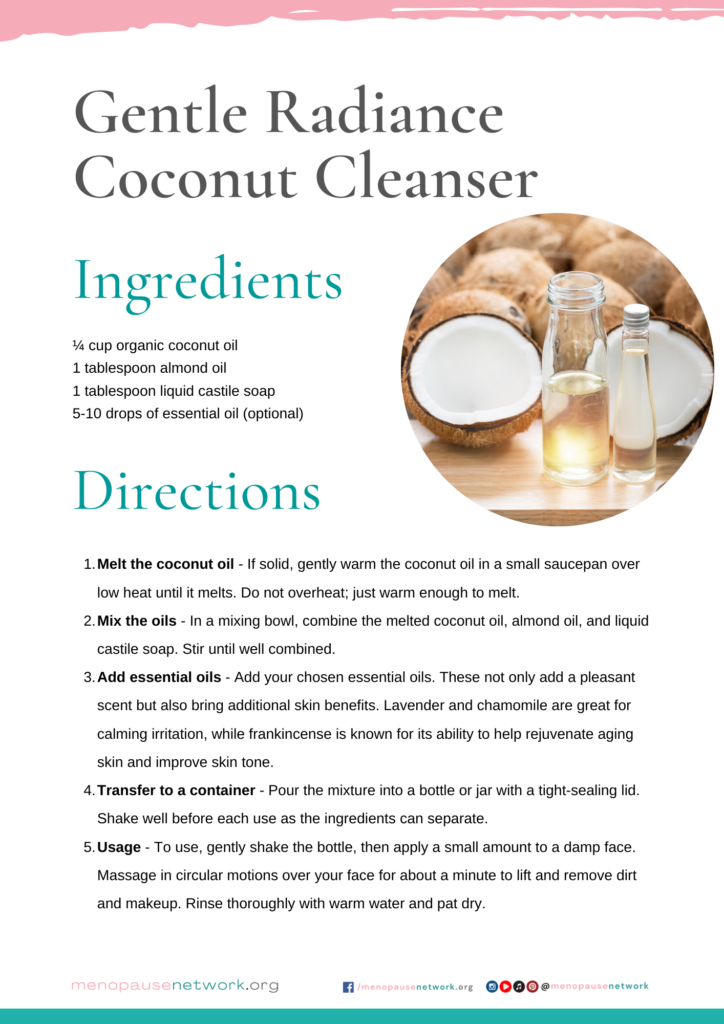Nightly Rituals: Sleep Your Way to Radiant Skin During Perimenopause

During perimenopause, the skin tends to dry out mainly due to hormonal changes, particularly a decline in estrogen levels. Estrogen plays a crucial role in maintaining skin health by stimulating the production of collagen and oils. Here’s how the drop in estrogen contributes to dry skin during perimenopause:
- Decreased Oil Production: Estrogen helps regulate the oil glands in the skin. As estrogen levels drop, these glands produce less oil, leading to drier skin.
- Reduced Collagen Production: Estrogen also promotes collagen production, which is vital for skin elasticity and moisture retention. Lower estrogen levels mean less collagen, which can lead to thinner, less elastic skin that retains less moisture.
- Thinning Epidermis: The outer layer of the skin, the epidermis, tends to thin with age and reduced estrogen, further diminishing the skin’s ability to retain moisture.
- Loss of Hyaluronic Acid: Estrogen helps maintain levels of hyaluronic acid, which binds water in the skin. As estrogen declines, so does the concentration of hyaluronic acid, resulting in less hydrated skin.
These changes can leave your skin more prone to dryness, irritation, and wrinkles during perimenopause. Fortunately, establishing a consistent nightly skincare routine can counteract these effects and help restore your skin’s radiance and softness. Here’s a straightforward routine to get you started.
Cleansing
Start your nightly skincare routine with a gentle cleanser. This is crucial for removing the day’s accumulation of dirt, oil, and makeup, which can exacerbate skin dryness and irritation if left overnight. Choose a hydrating cleanser that is free from harsh sulfates to ensure it cleans without stripping the skin of its essential natural oils. Gentle, creamy, or oil-based cleansers are excellent choices as they effectively cleanse while also contributing additional moisture to the skin.
Creating a DIY cleanser is a great way to ensure your skincare is natural and tailored to your specific needs, especially during perimenopause when your skin requires extra care.
Here’s a simple recipe for a homemade cleanser that can help combat dry skin and wrinkles:

About the Ingredients
- Coconut oil – Rich in fatty acids, it’s excellent for moisturizing and has antibacterial properties
- Almond oil – Packed with vitamin E, almond oil nourishes and softens the skin, reducing the appearance of aging.
- Castile soap – A gentle, natural soap that cleans without stripping natural oils.
- Essential oil (optional) – Lavender or chamomile for soothing properties, or frankincense for its anti-aging benefits.
Tips:
- Always perform a patch test with homemade products to ensure you do not have a reaction to any ingredients.
- Store your DIY cleanser in a cool, dry place, and consider making small batches to maintain freshness, as homemade products do not contain preservatives.
- This cleanser is especially good in cooler months or for those with naturally dry or mature skin, given its moisturizing properties.
This DIY cleanser provides a gentle yet effective solution to cleanse your skin, providing hydration and tackling signs of aging without harsh chemicals.
Toning
After cleansing, apply a hydrating toner. This step is essential for several reasons. First, it helps to rebalance the skin’s pH levels, which can be disrupted after cleansing. A balanced pH protects the skin from bacteria and pollution. Secondly, toners can enhance the skin’s surface, allowing it to better absorb the subsequent skincare products. Opt for alcohol-free toners with soothing ingredients like aloe vera, chamomile, or cucumber, which provide hydration without irritation.
Moisturizing
The final step in your nightly routine should be to apply a rich, emollient moisturizer. Night creams are typically denser and more hydrating than day creams and are formulated to support skin repair during sleep. Ingredients like hyaluronic acid, glycerin, and ceramides are particularly beneficial as they not only lock in moisture but also help to strengthen the skin’s barrier function. This reinforcement is vital during perimenopause when the skin’s natural barrier is weakening due to hormonal changes. These ingredients collectively work overnight to deeply hydrate, plump up the skin, and reduce the appearance of fine lines and wrinkles, leaving the skin more resilient and smooth.
Targeted Treatments
Incorporate products with retinoids, peptides, or antioxidants like Vitamin C or E. These can help combat the signs of aging by promoting cell turnover and fighting free radical damage.
3. Embrace Overnight Hydration Masks
An overnight hydration mask can be a game-changer for dry, perimenopausal skin. These masks are designed to deeply hydrate and nourish the skin while you sleep, leveraging the body’s natural reparative processes. Ingredients like aloe vera, algae extracts, or shea butter can provide an extra hydration boost.
4. Humidify Your Bedroom
Maintaining moisture in your bedroom environment can also help combat skin dryness. A cool-mist humidifier adds moisture to the air, which can prevent your skin from becoming too dry, especially in colder months or in air-conditioned rooms.
5. Prioritize Sleep Quality
Sleep is not just a beauty ritual; it’s a necessity for overall health, particularly during perimenopause. Lack of sleep can lead to increased cortisol levels, which may exacerbate skin dryness and aging. Aim for 7-9 hours of quality sleep per night, and try to maintain a consistent sleep schedule.
Tips for Better Sleep:
- Keep electronic devices out of the bedroom to avoid blue light exposure.
- Invest in comfortable bedding and pillows to support a good night’s sleep.
- Consider relaxation techniques like meditation or reading a book before bed.
6. Check Your Diet
What you eat can also impact your skin health. Foods rich in omega-3 fatty acids, like salmon and flaxseeds, can help maintain your skin’s oil production and hydration levels. Additionally, stay hydrated by drinking plenty of water throughout the day.
7. Consult with a Dermatologist
If you find your skin issues are difficult to manage, consult with a dermatologist. They can offer treatments such as hormone replacement therapy (HRT) or specific skincare products that cater to hormonal skin changes.
By implementing these nightly rituals and taking care of your overall health, you can significantly improve the condition of your skin during perimenopause. Remember, each woman’s skin will react differently during this transition, so it’s important to listen to your body and adjust your skincare routine accordingly. Here’s to waking up with more radiant and rejuvenated skin!
